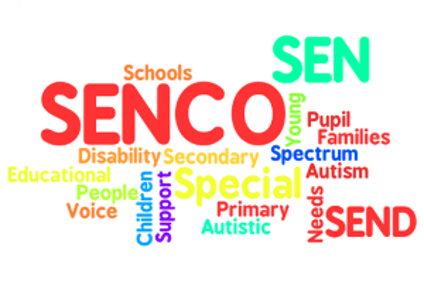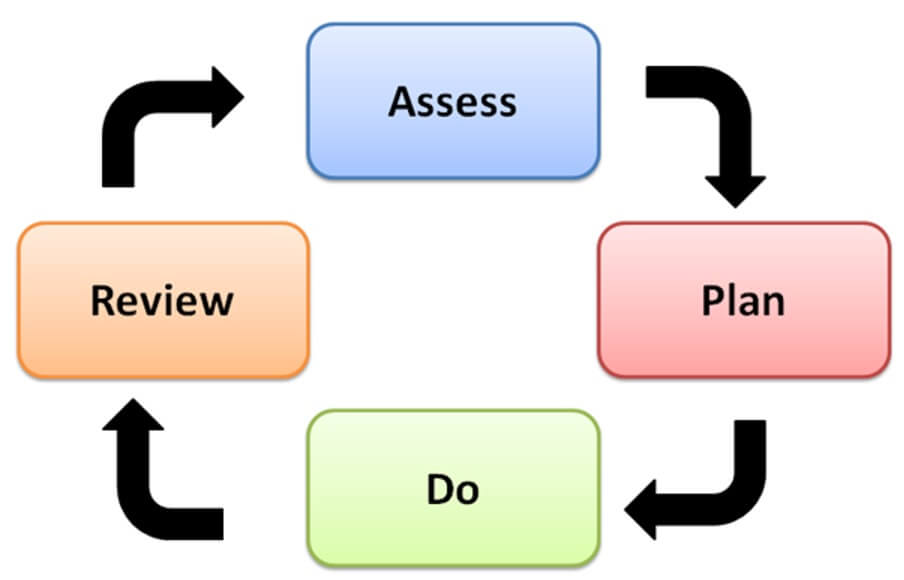Most children and young people in mainstream schools will have their special educational needs met through good classroom practice. This is called Quality First Teaching.
Early Identification of Need
In deciding whether to make special education provision to support educational, social, physical or emotional needs, we aim to identify children who have any difficulties as soon as possible so that appropriate support can be given from the earliest stage. Full use is made of information passed to the school when a child transfers and we use assessments to identify pupils and any difficulties they may have.
Other strategies used by our teachers to identify SEN include:
- Discussion with parent/carer to see if they have noticed anything/have any concerns
- Ongoing teacher assessment and observation at all ages and abilities
- Performance measured against National Curriculum age-related expectations, particularly in English and maths
- Standardised screening or assessment tasks (e.g. Reading/Comprehension Tests)
- Results from Statutory Assessments (end of KS2) and Teacher Assessments in Years 3 to 5
- Referrals and recommendations from External agencies (i.e. Speech & Language Therapy; Cognition & Learning Team, CAMHS)
SEN Support
Where a pupil is identified as having a special educational need, we follow a graduated approach which takes the form of cycles of “Assess, Plan, Do, Review”.
This means that we will use ongoing and termly assessment strategies as listed above to identify individual needs. This is done by staff who know the children, and who work together to identify progress and to identify gaps in learning.
Targets and interventions are planned using a Support Plan and records are kept by the appropriate adults (Teacher or Support Staff). Different children require different levels of support to achieve age related expectations, and we expect that parents/carers would work with us, alongside any other appropriate, external agencies.
These actions are reviewed each term and parents are invited to do this with us. Children’s views are taken into consideration throughout the process and are consulted during targeted time and throughout their interventions. All information is shared with parents/carers at Parent Consultation events, or in meetings with the SENCO.
- Assess a child’s special educational needs
- Plan the provision to meet your child’s aspirations and agreed outcomes
- Do put the provision in place to meet those outcomes
- Review the support and progress
As part of this approach every child with SEN will have an individualised SEN Support Plan that describes the child’s needs, outcomes & provision to meet those needs. Parents/carers and children's (where appropriate) views are integral to this process.
A small percentage of children and young people with significant and/or complex needs may require an assessment that could lead to an Education, Health and Care Plan.
Where the child or young person has not made expected progress despite having provision specific to their needs during at least 2 cycles of Assess, Plan, Do Review, the school or parents may consider requesting an Education, Health and Care needs assessment. An EHC Assessment may not always result in an EHC Plan. The Local Offer provides more information and is available on the Policies page of the website.
Details of Identification and Assessment of Pupils with SEN
Copley Junior School works hard to ensure it is an inclusive school. Quality First Teaching is provided in all classrooms across the school, and all children are treated as individuals throughout the learning process.
Teaching and learning is observed and monitored for quality and inclusivity by the senior leadership team. Through individual and whole-staff discussions, pupil progress is tracked at least half-termly where a child has identified additional needs. Differentiation is used as needed across the curriculum; often this is by resource or support, but can also be by task or outcome following structured adult input.
Interventions are both responsive and planned. Daily booster, keep-up or pre-teaching sessions, for individuals or small groups, may occur at key points during the day and are carried out by both teachers and support staff, depending on need. Interventions may be 1:1, although some may be small groups where the need may be similar, or for example where social skills are to be developed.
As part of the SEN procedures within school, all children on the SEN register have their own Support Plan. These are written and evaluated as part of the ‘assess, plan, do, review’ schedule. Teachers identify targets for the children and support staff, where available, help with provision. Teacher assessments at the end of each half-term are used to track progress. Records are kept of all interventions and staff can use these to plan, or re-plan, upcoming sessions.
Children are consulted throughout their intervention sessions so that staff can improve or alter provision as needed. Parents are invited each term to give their input into the next round of targets, and to evaluate their child’s progress. This is done at SEN Review Meetings. There is no difference in the expectations of staff on the progress made by children with SEN. We hope that additional needs are met to enable these children to make at least expected progress.
All learners with SEN are included when teachers are planning their curriculum and activities which take place both in and out of the classroom. It is our intention that all children should have equal access to everything provided in school, and we will do our best to provide support to ensure this is possible (i.e. education visits, after-school clubs). This is in addition to providing timetabled in-class support where deemed necessary by the school.
When discussing approaches to be taken to address needs and provide additional support, all staff are involved from the outset. This ensures that everyone is aware of the provision available to the children, and how the provision or interventions have been decided upon and timetabled.
Children with SEN are assessed, where appropriate, by the same means as the rest of the school. They are carefully tracked through both internal and external data. Often, additional assessments are carried out as part of a baseline for intervention, or for staff to plan appropriate provision, i.e. Nessy assessments, Reading Tests.
Most assessments across school are carried out as part of normal classroom practice. Where children reach statutory testing age, we administer tests according to the guidance provided. Where children qualify for additional time, or other adaptations, we ensure that this is provided. Where children are working below the standard of the tests, they may be withdrawn.
Adaptations are made for children where we think appropriate. For example, our Accessibility Plan describes our good practice in the key areas to ensure children of all abilities can participate in the curriculum, and in school life in general.
Additionally, policies (such as the Behaviour and Relationships Policy) may be differentiated or adapted for children who struggle to conform due to additional needs which require support.
We adapt the curriculum and learning environment for pupils with SEN in a number of ways, depending on the nature of each child’s needs. Such strategies include:
- Adaptive teaching and flexible groupings
- Additional small group support with a teacher or support staff
- Additional resources e.g. word banks, number squares, use of commercial schemes, scaffolds, sentence stems
- Teaching activities to be adapted to the preferred learning style of the child, e.g. a multisensory, practical approach or use of visual cues
- Use of ICT to support learning
- Individual behaviour systems/charts
- Adaptation of curriculum resources or classroom displays
- Targeted interventions to support specific difficulties (i.e. dyslexia, dyspraxia)
- Use of Makaton to support communication skills
We believe that supporting all children to learn and participate in all aspects of school life is important. In addition to the formal requirements of the National Curriculum, our children are offered a range of experiences and opportunities in which they can develop social skills including resilience and independence.



